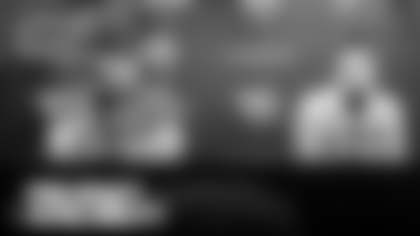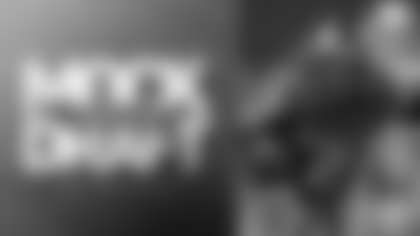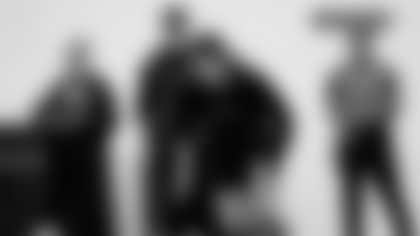Join jaguars.com senior editor Vic Ketchman as he tackles the fans' tough questions.
Baldvin from Iceland:
Can you please tell us a little more about this Bo Jackson guy. Why do you claim he was a better athlete than Michael Jordan? Is it just because you are a football guy or could he actually jump higher than Jordan, run faster than him and did he not just play once a week for 16-20 weeks as opposed to Jordan playing over a hundred games a season?
Vic: Where were you? Were you frozen in time? For starters, Bo was a very good major league baseball player. That meant Jackson played in a 162-game season before he put on his football cleats. We already know Jordan wasn't much of a baseball player or golfer. What was he other than a basketball player? Bo, baby, could've done anything he wanted.
Ryan from Hamilton, Ontario:
Hearing these fans recalling that terrific game between the Steelers and Jags brings fond memories to me as well. That game was the first Jaguars game I actually sat down and watched and I remember coming away in awe of what I had just witnessed. From that day forth I have been a die-hard Jags fan and I will always remember 12/5/2004.
Vic: Your story is representative of a lot of people who became Jaguars fans that night. That's why I say something happened that evening that altered the Jaguars' course of history. Something was born that night. There's no doubt in my mind about that.
John from Jacksonville:
Another tidbit about your favorite coaching decision play was that an offensive lineman jumped offside and it wasn't called. What would instant replay have done with that?
Vic: If you're referring to the system of replay review, it would've done nothing. It doesn't allow for review of that situation. If you're simply referring to instant replay, it was very much a tool TV used at that point in time. Instant replay was first used in the 1963 Army-Navy game. Once TV created the technology, it went instant replay crazy. John, you're picking at something very small on a day when playing football was so difficult that men lost fingers and toes and a fan died of exposure. You need a little more spirit of the game and a little less critical analysis of it.
Chris from Stafford, KS:
Jimmy Smith deserves to be in the Hall of Fame. Do you think he will get there?
Vic: I don't know if he will or won't. It'll be difficult. That's not, however, what I want to tell you. Since you're a fan of Jimmy's, I thought I'd tell you and all of Jimmy's other fans who read this column that I spent some time talking to Jimmy on Saturday night. I went out for a late dinner and after I sat down I turned and saw that Jimmy and his family were seated near us. Jimmy came over, sat down and, right away, asked: "How's the team doing?" It was not a rhetorical question. He wanted to know in fine detail what the team looked like. We had a nice conversation and he said he loved jaguars.com's video tribute to him. It was great to see him out and about.
Bryan from Conway, AR:
Bo Jackson or Jim Thorpe? Who was the better athlete?
Vic: I would love to be able to answer that. Unfortunately, we have almost nothing in the way of historical information to form an opinion on Jim Thorpe, and that's a tragedy because it's possible, very possible, that Thorpe is the greatest athlete in this country's history. We have film on Babe Ruth, but almost nothing on Thorpe. Ruth was covered by some of the country's legendary sportswriters, but Thorpe played in near anonymity. Here's what we know about him: He was 6-1, 202. Now that's a big man for back then. He ran with the ball, threw the ball and kicked field goals and extra points. Unfortunately, there are no accounts of his rushing yardage or pass receptions, but he ran over and around tacklers. What's important to know is that Thorpe physically dominated the game and he excelled in every sport he played. He won the 1912 Olympic decathlon but was later stripped of his gold medal because it was discovered that he once was paid to play minor league baseball. In 1912, Thorpe scored 25 touchdowns in leading the Carlisle (Pa.) Indian School to the national collegiate championship. His life after football was tragic. He wandered aimlessly and was overcome by alcoholism. Our disgrace is that Thorpe was never embraced for his athletic greatness. He was rejected and exploited and we still haven't fully acknowledged his greatness. Thorpe or Jackson? I'm not sure.
Brad from Jacksonville:
What's your favorite Stevens Point, Wisc., story?
Vic: I have a lot of memories of the Jaguars' first-ever training camp, but most of the stories don't lend themselves to great story-telling. I remember the temperature hitting 106 degrees the first week of camp and I remember the rooms not being air-conditioned. I remember Tom Coughlin absolutely "killing" his team in two-a-days. I remember hearing this deep hum in the room next to me and, every once in awhile, feeling a cool breeze under my door. After a few days of this, I knocked on the guy's door. When he opened it, there was big, industrial-strength air conditioner sitting in his room and the place was like an ice box. "Hi," I said, "I'm Vic." The other fellow was Ron Hill, the Jaguars' pro personnel director. He moved on to the Atlanta Falcons in 1998 but we remain best of friends and we just met for a couple of cold ones this past weekend. We were all new that year. We all came from different places. We made friendships that will last the rest of our lives. I know it's kind of corny, but that's what I really remember about Stevens Point.
Kyle from Flagler Beach, FL:
In your opinion, which position can usually benefit the most from outstanding play in training camp?
Vic: I've always liked to see a lot of linebackers. They're the run-and-hit guys. They're the ones, in my opinion, who define the athleticism of your roster. That's where you find your special teams players.
Jaime from Jacksonville:
This is in response to Carter's comment about the picture that inspired the Charlton Heston movie. Is there any way to show this picture on the website.
Vic:

This is the picture to which you are referring. It is known as "Anguish of Losing" and it's one of the most famous football pictures in history. It's a picture of Giants quarterback Y.A. Tittle kneeling on the turf at Pitt Stadium in a game played on Sept. 20, 1964, the final year of Tittle's 17-year pro career. I can't remember the exact circumstances involving the picture, but I think Tittle was hit by defensive end John Baker, who also knocked off Tittle's helmet. Tittle's nickname was "The Bald Eagle." The picture inspired a scene in the 1969 movie, "Number One." Do a search on Y.A. Tittle and I'm sure you'll find a reference to the picture. The full-frame shot is pretty poignant.
Chris from Jacksonville Beach, FL:
I agree that Spurrier's offense with the Redskins was pathetic. I'm still trying to grasp what Urban Meyer is doing with UF now. Is this basically a souped-up "Run and Shoot" offense?
Vic: I think that's a fair description. It's what I call a motion offense, which is very big in college football today. Meyer's offense, with Alex Smith at quarterback at Utah, specialized in a lot of high-percentage, short passes that got the ball to receivers on the run. Meyer's a top coach. Give him time to get his people in place.
Chris from Jacksonville Beach, FL:
The 12-5-04 game vs. the Steelers was special, but what made it a truly unique experience was the group of guys that I go to every game with tailgated with Steelers fans before and after the game and there was no animosity or bad blood. That has never happened before or after with any fans from the opposing team.
Vic: Chris, your story is not unique. I have gotten e-mail after e-mail from people who've told the same story. I think it's wonderful.
Weaver from Bentonville, AR:
I was reminiscing about the intensity of the great rivalries such as Dallas vs. Washington or Kansas City vs. Oakland in the 1970's. In your opinion, are there any rivalries today that match the intensity those produced?
Vic: I don't think the rivalries of today match the fierceness of the rivalries in the 1970's because the game has become more civilized. Pro football in the '70's was fierce and frightening. The viciousness of the game resulted in Darryl Stingley being paralyzed for life. It was that viciousness that made the feelings so intense. There was a war-like quality to some of those games. One such rivalry resulted in Pete Rozelle sending a letter to each team, warning them that games between the two teams had become dangerous and if any further incidents occurred the series would be suspended.
Thomas from Pago Pago, American Samoa:
Pennington and Leftwich were back-to-back Heisman candidates at Marshall. How close are they personally?
Vic: They are very close friends. Chad Pennington was Byron Leftwich's host when Leftwich was recruited to Marshall. How close are they? Well, let me put it to you this way: Leftwich has a kind of funky grip of the ball that I had never seen anyone else use until I happened to see a picture of Pennington in pass formation.
Shane from Nitro, WV:
I love Fred Taylor as much as any Jags fan but isn't part of the reason Byron Leftwich has struggled so much is the lack of a consistent running attack?
Vic: Your question doesn't interest me but I love the name of your hometown. It's one of my all-time favorite hometown names. If memory serves me correct, former Braves pitcher Lew Burdette, the MVP of the 1957 World Series, is from Nitro, WV.
Bryan from Paterson, NJ:
Do you know a website that sells "Tackle Twill" football jerseys for the Jaguars?
Vic: If you asked me the atomic number of Seaborgium, there's a better chance I could answer.
Sam from Jacksonville:
What is your all-time favorite interview and why?
Vic: It was with a journeyman wide receiver named Johnnie Dirden, whose pro career began after he jumped out of a cement truck, walked into the offices of the Houston Oilers and convinced Bum Phillips to give him a try-out. I've told this story before but I love to tell it so much that I'll tell it again. It was some time in the early 1980's when Dirden was having a pretty good training camp. I went to his room in pursuit of the traditional longshot success story. When I got to Dirden's room, the door was open a crack and it was dark inside. I knocked but nobody answered. After I began to walk away, I heard a hushed, "Pssst, wadda you want?" I told him what I wanted, he let me in the room and I proceeded to do the interview in the dark. After I was done, I asked why he kept the room dark and the door cracked. He said he liked to see who was at his door. He said that if it was the guy he thought was "The Turk," he wouldn't answer. "They can't cut you if they can't find you," Dirden said. I love that story so much.













